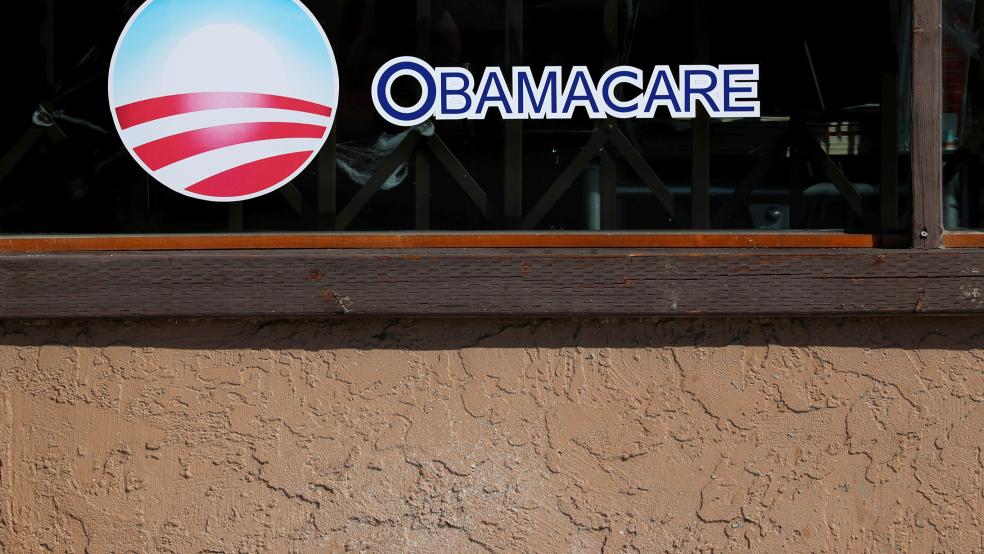The fate of Obamacare may once again wind up before the Supreme Court now that a federal judge in Texas has ruled that the law is unconstitutional.
U.S. District Court Judge Reed O'Connor ruled on Friday that the law's individual mandate is unconstitutional. The Supreme Court had upheld the legality of the mandate in 2012, ruling that it fell under Congress’ power to impose taxes. But as part of the Republican tax law passed last year, Congress eliminated the fine for not complying with the mandate. Without that penalty, O’Connor ruled, the mandate is no longer a tax and thus violates the Constitution — and, because the mandate cannot be separated from the rest of Obamacare, the judge said, the entire law is also invalid.
The controversial ruling in the case, brought by 20 Republican-led states, means that debate over the law will once again be front and center in the nation’s capital — and across the country — as a new Congress is sworn in come January.
Here’s a rundown of what happens next and what’s at stake:
Is Obamacare dead? No, far from it. The judge did not grant an injunction blocking the Affordable Care Act from being in effect. His ruling is sure to be appealed, first to the Fifth Circuit Court of Appeals in New Orleans and potentially to the Supreme Court, and the White House said the law will remain in place as the appeal process plays out. Many legal analysts and lawmakers in both parties say the judge’s sweeping decision is likely to be overturned, with some dismissing the decision as a blatant example of partisan judicial activism resulting from a weaponized court system. “Congress has explicitly said that it thinks the ACA can and should exist even without a federal individual mandate; it voted to do precisely that last year,” Bloomberg’s Max Nisen noted. “That seems like the precedent that should be looked to. Instead, this judge chose to rely on a creative interpretation of congressional intent when it first passed the law in 2010.”
Democratic leaders said they will call for a vote to intervene in the case once the new Congress convenes. "A lot of this depends on congressional intent. And if a majority of the House and a majority of the Senate say that this case should be overturned, it'll have a tremendous effect on the appeal," Senate Minority Leader Chuck Schumer (D-NY) said Sunday on NBC’s “Meet the Press.”
What happens if the ruling is upheld? It could create chaos across the U.S. health care system — “the consequences would be disastrous,” The Economist said. “When the Supreme Court considered the law in 2012, Obamacare was not yet in effect. Today, it is in full swing. Required coverage of people with pre-existing conditions would disappear. Young adults counting on remaining on their parents’ insurance until the age of 26 would be suddenly booted into uninsured status.” Nearly 12 million people got health care coverage through the ACA exchanges last year, and another 15 million people have gained coverage through the law’s Medicaid expansion. Those gains could all be reversed.
Will Republicans come to rue this ruling? O’Connor’s decision “illustrated the fruits — and possible perils — of [Republicans’] long-running campaign, stepped up in the Trump era, to remake the judiciary through the confirmation of dozens of conservative judges, including two appointees to the Supreme Court,” The New York Times’ Sheryl Gay Stolberg, Robert Pear and Abby Goodnough said. President Trump celebrated the Texas decision, calling it “Great news for America!” But other Republicans were far more reserved, faced with the problematic prospect of a renewed Obamacare fight after the midterm election drubbing their party just took from voters worried about health-care costs and protections for Americans with pre-existing conditions. Recent polls have found that the Affordable Care Act has grown more popular with Americans, with about half or slightly more now favoring the law. Support for key elements of Obamacare, like its protections for those with pre-existing protections, is significantly higher.
In that context, the court ruling “spells bad news for Republicans, by allowing Democrats to replay a potent health care message that helped them flip 40 House seats: that the GOP remains hellbent on gutting Obamacare and rolling back protections for pre-existing conditions,” Politico’s Paul Demko and Adam Cancryn wrote. Some Republicans voiced optimism that the ruling would open the door for cooperation between Democrats and Republicans to fix the health care law, but with the 2020 election cycle already under way, ramped up political bickering may be more likely than a bipartisan path forward.





